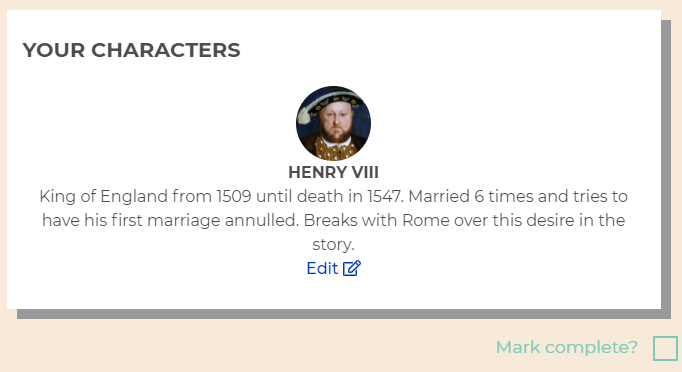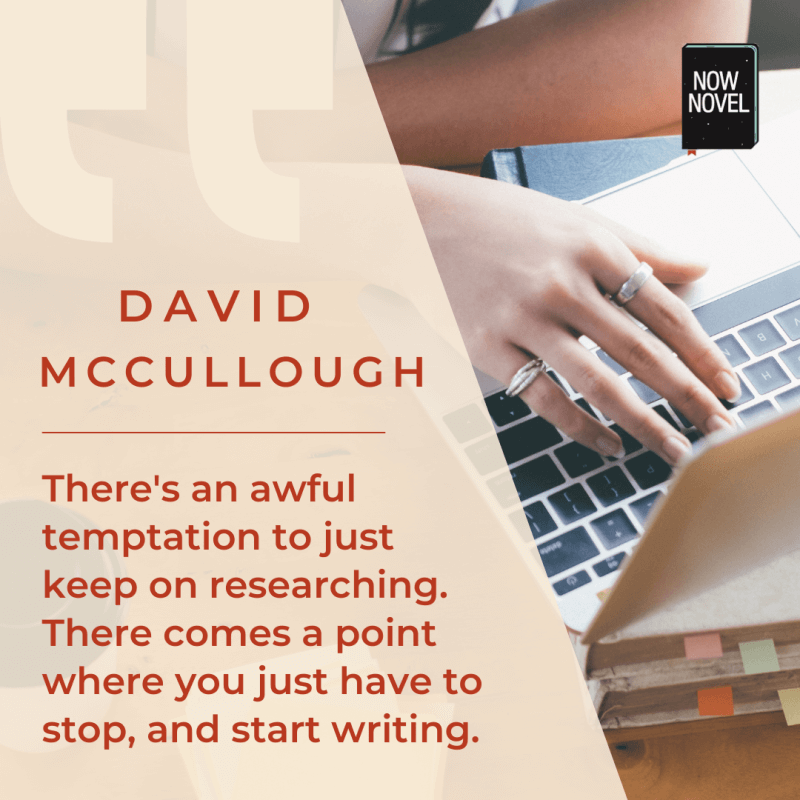Deciding how to research for a book is a personal process, with much depending on your subject. Read 9 tips on how to research a novel:
How to research for a book: Scope, process, tools
- Define the scope of research
- List headline research you’ll need
- Do a ‘quick and dirty’ search
- Lean on .edu and library resources
- Speak to pros and specialists
- Shadow an expert if applicable
- Read authors on how to research a book
- Have a system for storing research
- Stop when you have enough to write
1. Define the scope of research
Research for a novel easily gets out of hand. You’re writing about Tudor England, for example. The next thing you know you’ve read every doorstop ever written about Anne Boleyn.
Define the scope of research you need to do, first.
This is particularly crucial if you’re new to researching novels.
‘Scope creep’ (where the task becomes bigger and bigger, and the focus dimmer) is a common challenge in research.
If, for example, you’re writing a novel featuring the Tudors (rulers of England between 1485 and 1603), ask questions such as:
- What duration within this era will my story span? (e.g. ‘the last five years of Henry VIII’s life’)
- What information is vital to know? If, for example, you’re writing about a monarch firing a particular associate, this will narrow down your research
- What broad picture elements do I need? (For example, a timeline of key background social or political events within a historical period)
Narrow down what you need to learn to the essentials necessary to begin writing.
2. List headline research you’ll need
Once you know the scope of your research, list the big, main events and subjects you’ll need to cover.
For a historical figure subject like Henry VIII, you might have a list of research to do like this:
- Timeline of major events in the king’s life
- Personality – accounts of what the king was like
- Appearance – descriptions of what the king looked like
- Controversy – king’s many wives, execution of Anne Boleyn, etc.
Make a document with a section per each of the core areas of the story you’ll need to research.
Populate these sections with article snippets, links to educational resources.
(Google, for example ‘Henry VIII reign .edu’ to find information from credible learning institutions.)
3. Do a ‘quick and dirty’ search
In learning how to research for a book, learn how to work smart, not hard. Research the way a student with an assignment hand-in due the next day would, to start.
Use Wikipedia (a no-no in academia). You can find broad information and an idea of what to look for to verify and fact-check later on .edu and library websites, or in physical book copies.
Search amateur history blogs, too. There are many subject enthusiasts who have devoted hours to digging up interesting historical and other information and share their learnings for free in blog articles.
If you’re writing about a real place, use Google Maps to do a street-view virtual tour. You can explore cities you’ve never been to before.
Read more more on researching place when you are unable to get there.
Note details to include in scene-setting and worldbuilding such as specific landmarks and architectural details.
Get a professional edit
A good editor will help pinpoint major factual inaccuracies and other issues.
LEARN MORE
4. Lean on .edu and library resources
When deciding how to research for a book, whether it’s fiction or non-fiction, favour credible resources.
You can even find fantastic primary source scans and recordings. Some examples of excellent, free online research resources:
- British Pathé: Pathé News, a producer of newsreels and documentaries from 1910 to 1970 in the UK has a rich and varied archive. It includes original footage (trigger warning: disturbing footage of aircraft explosion) of the Hindenburg Disaster.
- Tudor History: Historical .org websites such as this website on the Tudors provide a wealth of research information.
- The Smithsonian has regular online webinars, exhibitions and more where you can learn about a diverse range of natural history topics from experts.
If online research feels overwhelming, consider taking a course in online research skills.
The University of Toronto also put together this thorough list of questions to guide doing research online.
5. Speak to pros and specialists
Learning how to research a novel is made much easier by experts who are happy to share their knowledge.
If you are researching a specific place, language, historical figure, biological or medical issue or another detail, make a list of experts to reach out to.
Explain your fiction or non-fiction project and why you’d value their insights. You’ll be surprised how many are only too happy to contribute accurate, informed knowledge.
You can also find specialist knowledge in online forums devoted to specific subjects.
6. Shadow an expert if applicable
There’s no single ‘right way’ in how to research for a book.
You could take a leaf out of the method actor’s book, for example, and actually job shadow an expert [Ed note: Once COVID no longer sets stringent limits on contact].
Depending on the subject or industry, you may have variable degrees of success. For example, shadowing a medical professional has other issues involved, such as patient privacy/confidentiality.
In a roundtable discussion on preparing for roles, British actress Vanessa Kirby described job-shadowing on an obstetrics ward to research a role. Because she had never had a child herself, she wanted to give an authentic performance of a woman in labour (around the 18:15 timestamp).
Writing is very much like acting in this respect: You need to be able to fill in the blanks in your own imagination to prepare.
7. Read authors on how to research for books
In deciding how to research for a book, one also needs to decide how/where to use (or alter) source material.
It’s helpful to read authors who write historical fiction and other research-heavy genres. What do they say about process?
Hilary Mantel, for example says this about taking creative license with historical facts:
History is a process, not a locked box with a collection of facts inside. The past and present are always in dialogue – there can hardly be history without revisionism.
Hilary Mantel: ‘History is a process, not a locked box’, via The Guardian
8. Have a system for storing research
Research for a book easily becomes cluttered.
How do you keep research tidy and manageable, so that you have the information you need when you need it?
Organise your research for a novel with these apps and tools:
- Google Docs: Outline mode creates a clickable outline of your document in a left-hand panel – perfect for jumping between different categories of research.
- Evernote: This handy app makes it easy to snip bits of articles from your browser into collections to sort and store.
- Sytem folders: Create a folder on your operating system for your project, and subfolders for each research topic.
- Novel Novel Dashboard: You can also fill out character profiles and other prompts on Now Novel using historical sources (see an example below).

9. Stop when you have enough to write
In deciding how to research for a book, it’s important to set a stop point.
Ask yourself how much you really need to begin writing. Need to know what would have been served at a royal dinner in the year 1600? Make a note to add this detail later and describe the details of the occasion you can make up to keep going with your draft.
Balancing research and writing will ensure your research is fit to its purpose – finishing your book with relevant and precise detail.
Need help researching your book? Watch our webinar on writing research (and enjoy future live webinars and Q&A sessions too) when you subscribe to a Now Novel plan.



